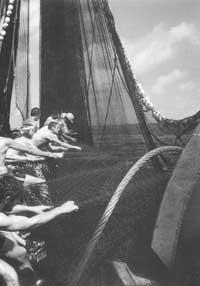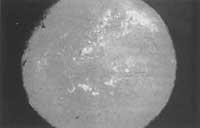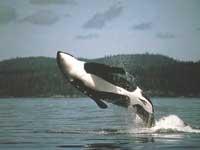The African Sea as a European Orchard
2001/09/09 Mendiburu, Joana - Elhuyar Zientziaren Komunikazioa | Roa Zubia, Guillermo - Elhuyar Zientzia
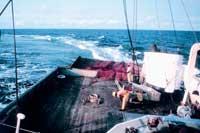
Mauritania's Banc Arguin Park, declared a national park in 1976, remains the largest marine park in Africa. Fish are born and grow from the 2,000 kilometers of coast between Morocco and Guinea Bissau. In the words of the park director, Jean Worms, "In full sun, a sea stream that adds rich underwater waters makes it full of food. This food is the beginning of the long trophic chain formed by many fish and millions of birds, including 2 million birds migrating from Europe. It is a rich place, no doubt, but wealth has always attracted many people, and this is no exception.
The rich marine regions are known to all the world's fishermen. Although many of them have been exploited by fishing without measures, it seems that the sea has not yet managed to make understand the subject. In fact, it was thought that Banc Arguin, Africa's largest marine park, would never run out, but local scientists and fishermen see a dark future.
Two types of anglers in a single fishing spot
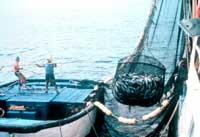
A decade ago the inhabitants of the park environment, the communities of some poor deserts called Imraguen, only fished in the waters of the park. Since then things get complicated a little and get worse. At present, in the Banc Arguin National Park there are only dozens of small boats nearby. But the fish do not know the limit of the park and, therefore, its protection and, depending on the time, they move inside or outside it.
On the borders are the nets of thousands of traditional fishermen and, beyond that, with the reptiles who take more and less fish than traditional fishermen.
At the limits of the Park, the corner for Spain, the lobster for Portugal, the dorsal fin of the Asian shark, etc. They are fished. The European Union, for one euro per kilo to the government of Mauritania, fishing every year 250,000 tons of fish, half as foreigners, and even more in the waters of Senegal and Guinea Bissau. Thus, 600 (or more) repents capture 30 times more than small fishermen. The testimony of Mohammed Swidi Iwik, local leader, is enough to know the consequences of this fishing without measures. "Before we went fishing and saw the salmonetes until us.
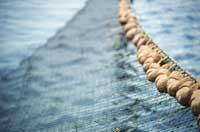
It was enough to enter the sea with the net to hunt. Now that's not the case, and I think they have fallen into the traps of Senegalese fishermen who fish salmonetes further north. In fact, in 1990 the fishing of the salmonete experienced a remarkable increase promoted by the new European market. These fishermen were fishing for that market and not for their plate. As expected, the stock of fish has decreased dramatically."
Now other fish are facing the same black future. In fact, with the decline in the fishing of the salmonete, many fishermen have begun to catch other fish. For example, the shark. Pierre Campredon, a biologist who works as an advisor to the fish management of the Mauritanian government, is not optimistic when he talks about the future of fishermen and believes that if one wants to see the success of the marine parks, the conservatives should assume the park. "All our conservation forces were in a vacuum in a few years."
Difficult management
As usually happens in all national parks, in the park of Banc Arguin there are also interests. While local fishermen and researchers are concerned, governments see fishing as a source of income necessary to settle their foreign debts, and foreigners proudly claim that their fishing benefits Africans.
Marine research in West Africa does not have a long history and it cannot be said that much money is spent. However, all researchers from Mauritania, Senegal and Guinea Bissau share opinion. The director of a research centre in Mauritania summarizes the situation: "The smaller and smaller cake has more food."
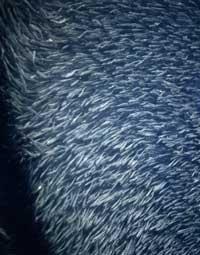
The University of Callum Roberts York researcher and world-renowned expert states: "Blacksmiths exploit Africa's marine resources too much and are unpacking the waters. They signed an international agreement on sustainable fishing, but if we continue on that path, the future of African fishermen is serious."
Fishing quotas are usually in the hands of local governments, but their dependence on fishing is too large to make the right decision freely. On the one hand, in coastal communities there are thousands of fishermen and 75% of the proteins taken by the inhabitants of Africa come from the sea. On the other hand, they need the money they receive from Europe to pay their debts.
Fishermen have also realized that they have been wrong. Dimas Santos, for example, works on the export of fish in Mauritania, selling besugo and fish to European accommodation. The current situation looks bad: "I buy only half of what I bought two years ago and also the most expensive price we have ever paid." In fact, even though local fishermen were moving away from the coast 600 kilometers, which before fished in 20 minutes, they now fish in four hours. Working days are longer and have to leave for fifteen days.
The opinion of the majority of the authorities and fishermen of the European Union is very different. According to the European Union fishing police, fishing is sustainable and the owner of Kevin McHugh Atlantic Dawn does not believe that Mauritania's marine resources are overexploited. Atlantic Dawn is one of the largest fishing boats in the world, with 144 meters long and 60 meters long and capacity for 7,000 tons of fish. Kevin confesses that they only work in waters of Mauritania, but ensures that they pass very strict controls. "Moreover, they want to see us how we go there, because for them we are a source of income."
Also take care of the sea
The 70% of the land surface is covered by oceans, although only 1% is protected. In fact, XX. Until the twentieth century, the human being has not considered ecosystems as an exhaustive heritage. The sea still seems inexhaustible, but the alarm has skyrocketed. More than 25% of the coral colonies are deteriorated and 70% of the fishing reserves have been exploited excessively or poorly. Water pollution is also a serious problem and many species sensitive to it are in danger of extinction. The capture of threatened species has not been interrupted. The conclusion is clear: the protection of the sea is essential. Protecting the sea is not easy for several reasons.
The first major obstacle is the administrations of the countries, which are adapting very slowly the legislation to protect the ecosystem and, in most cases, have been designed exclusively for land. In addition, the protection of the coastal environment is not usually sufficient, the size of the oceans demands another broader approach.
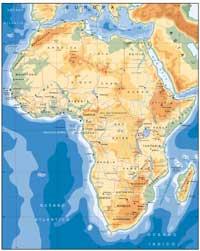
From a biological point of view, problems also arise. Protected spaces are allowed to be efficient if full ecosystems are included. However, fixing the ecological limits of the sea is not easy, since the influence between the factors is more complex than on land. Many marine species are migratory and move with currents in search of adequate temperatures.
Many times the larvae are born in one place and others grow and live. The protection of these species requires, therefore, to work in more than one area. In addition, in the management of protected marine spaces, we find the limit of our wisdom. It should be taken into account that, as complex ecosystems are concerned, an erroneous decision can have serious consequences. On the other hand, in general, it is open access areas and not fenced. Nature does not facilitate but we must recognize that the greatest obstacles have another origin. In some cases, the absurdity of the administrations has also aggravated the problem.
The designation of prohibited fishing areas is no easy task. In places where it has been shown that it is beneficial for the fishing activity itself, they have emerged without obstacles, but in general they are faced with interests of fishermen. The advantages are long-term and the needs of fishermen are daily.
Published in the supplement Natura de Gara

Gai honi buruzko eduki gehiago
Elhuyarrek garatutako teknologia




